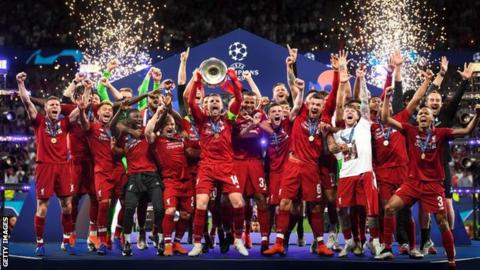At the end of a busy week of meetings and discussions, European football's governing body, Uefa, offered some clarity over how they hope the game will begin to recover from COVID-19.


As has become the norm for all football bodies, Uefa started by stating 'health was the priority'. After that came the plan.
Leagues should 'explore all possible options' to reach a natural conclusion. If this cannot happen 'suspended domestic competitions should restart with a different format'.
And if - due to government intervention or 'insurmountable economic problems' - there is no more play, European qualification for the 2020-21 season should be decided 'on sporting merit'.
The next Uefa executive committee meeting is on 27 May, by which time it is hoped competitive football will have returned to some countries and training in others - including England.
However, with one lot of answers, comes more questions.
The way forward?
Uefa has outlined a path to this season's Champions League final. It starts with the outstanding second legs of the last 16 - including Manchester City's tie with Real Madrid - on 7 or 8 August. After that, individual games in two-legged ties would be played every three or four days - Sundays are left free for any domestic fixtures. Their back-up plan involves one-match ties instead of two.
The final is set for Istanbul on 29 August.
Europa League games would be played a day before each two-day block of Champions League matches. The final is planned for Gdansk, in Poland, on 27 August.
It is understood UEFA will stick to the venues if they can, even though the games themselves will almost certainly be behind closed doors.
But entry to Turkey and Poland is currently blocked. Uefa are aware there are no guarantees these restrictions will be lifted, meaning alternative venues might have to be found.
Two competitions at the same time
If finishing this season's competitions is complicated, have a look at 2020-21.
Two hundred and thirteen clubs, from all 55 member associations, playing a total of 357 ties is needed to reach the group stages of the respective European tournaments, which are due start in the middle of October.
If this needs to be altered, it is understood Uefa would prefer to keep all clubs involved and play one-off matches, rather than chop away at the access list so some clubs and countries miss out on participation.
The planned start date is 28 July.
Quite apart from the logistical headache involved in all these games, even if they do go ahead, some would be played at the same time as the 2019-20 season is still finishing.
This raises some interesting scenarios.
Rangers are due to play Bayer Leverkusen in the second leg of their Europa League last-16 tie on 6 August. If, as expected, the Scottish season is declared over, they should be entering the 2020-21 competition in the second qualifying round, which is scheduled for 13 and 20 August.
Wolves, currently level after the first leg of their last-16 tie with Olympiakos, may well end up repeating this season's appearance in the third qualifying round, the first leg of which is scheduled in the same week as the 2020 final.
Quite what Uefa would do if Wolves or Rangers reached the final is anyone's guess.
As it stands both sides could be due to play in next season's Europa League, while still in with a chance of winning this season's competition - and thus qualifying for the Champions League.
Vested interests and no perfect solution
When West Ham vice-chairman Karren Brady used her newspaper column on 16 March to say she believed the domestic season would be declared 'null and void' she was condemned given her club's position close to the relegation zone.
A senior executive at a rival club was more sympathetic, telling BBC Sport privately it was inevitable officials would assess the situation from their own specific point of view.
So it has proved. Some Premier League clubs want the season to be given as long as possible to be completed. But the most strident of these tend to be the ones who play in Europe and have something to lose beyond domestic cash.
Others feel 30 June would be a good time to stop given the contractual wrangles that will surface after that date. Clubs around the relegation zone think no-one should go down from a campaign that is not completed. Those with a chance of coming up from the Championship feel the concept of promotion should be maintained.
In the EFL, League 1 and 2 clubs, who can see the financial impact of months with no games, or matches without fans, have discussed an early end to the season. In the Championship, especially at the top end, with over £100m on offer to promoted teams in normal times, they want to continue.
If legal challenges were threatened by South Shields after they were denied promotion to National League North, it is little wonder a well-placed source told the BBC it was 'fairly obvious' no solution will suit every club and therefore legal action was almost inevitable.
No football to 2021 in the non-league?
This is a very real possibility. There has been a suggestion even clubs in the National League are thinking about this as the impact of a statement by the government's chief medical officer Chris Whitty on Wednesday, when he said "highly disruptive" social distancing would need to be in place for "really quite a long period of time", sinks in.
Lower down the pyramid the situation is stark.
Should the current limit on gatherings be extended to just a small number of people, BBC Sport has been told by one league official there would be 'no point' in matches behind closed doors.
Below the National League, where there is no TV deal, virtually all revenue comes through supporters attending matches, either by their admission money or cash spent on food and drink, programmes and even raffle tickets.
And, unlike the National League and beyond, where clubs have primacy of tenure over their stadiums, at non-league level shared facilities and rented grounds mean extending seasons is a logistical impracticality.
It leaves many leagues and clubs in limbo and wondering whether there will be any play next season at all.
All eyes on Germany
For a number of reasons, including the UK Government's review of present lockdown criteria, it is not anticipated the current general position of football's major stakeholders will change for a couple of weeks.
What will become apparent in that time is whether the Bundesliga's ambitious plan to restart on May 9 has any chance of hitting the deadline.
The German game - and Germany's clubs - are wrestling with all the same problems others across the continent are encountering.
They may be at different points in the 'curve' but if a major league gets back on the pitch, it will give hope others can reach the same point.
The problem is, there are no guarantees and - as ever - there may be questions ahead no-one has thought of the answers to yet.

Nenhum comentário:
Postar um comentário